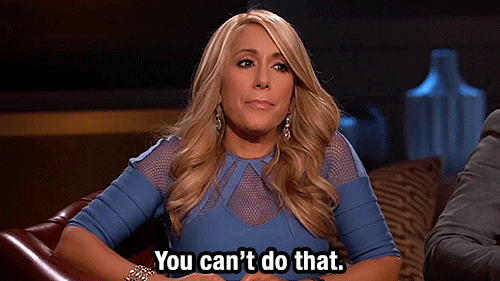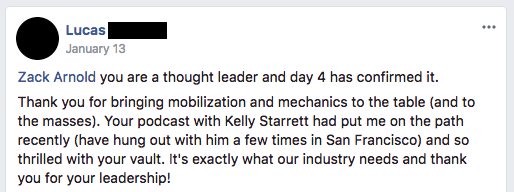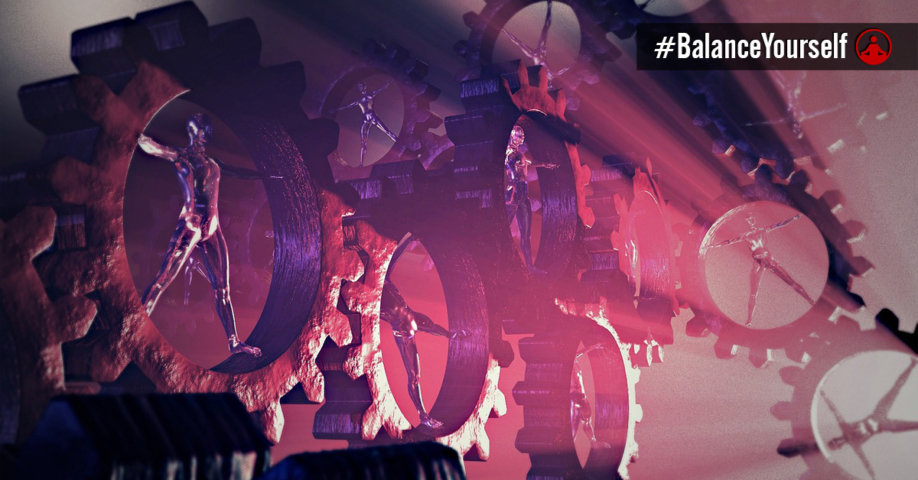Author’s Note: The following is an article I originally wrote for the site Growthlab.com titled “How I burned out as a burnout coach (and then bounced back)” republished in its entirety below.
» Click here to access the original article at Growthlab.com
One year ago, despite having just concluded another successful product launch, I could barely function as a human being (much less run my online business Optimize Yourself).
In short … I was burned out.
The irony: I had spent the previous 16 months of my life going from zero to multiple launches teaching others how to avoid burnout in THEIR careers.
The burnout coach was burned out. Yeesh.
Instead of celebrating my early success in the brave new world of online entrepreneurship (more than $33,000 in sales for my first product … starting with a list of only 600!), I spent the majority of the next several weeks mowing through endless bowls of popcorn watching “Shark Tank” thinking about what a failure I was.

Preach, Lori. Preach.
A paralyzing case of imposter syndrome stopped me from sending even a simple email to my list. And I routinely started (and finished) my day in the fetal position thinking, “My family would probably be better off without me.”
Despite having little desire to be alive at the time, deep inside I was 100% confident that if I found a way to climb out of “The Dip,” there would be a tremendously valuable learning experience waiting for me on the other side.
The price of that knowledge would be accepting how painfully obvious it was that several poor choices led to my massive bout of entrepreneur burnout, suicidal depression, and a raging case of imposter syndrome.
Given the foundation of my online business is teaching others how to get sh*t done and achieve their most important goals (without sacrificing their sanity in the process), I want to make sure you don’t make the same mistakes I did and avoid a flame out yourself.
How I set myself up for “failure”
I’ve worked as a successful Hollywood film and TV editor for the last 15 years, but deep inside I’ve always wanted to do meaningful work that directly impacts the lives of others. So in September 2016, I made a declaration: I would no longer accept film editing work so I could focus on building my online business full-time.
Mistake 1: I “made the leap” without thinking
I turned down eight high-profile projects in the span of one month, including three high-profile network TV pilots, a hugely successful HBO series, and a new show for Netflix produced by an Oscar-winning actress. (Seriously, if I gave you show names you’d fly out to Los Angeles to punch me in the face for my stupidity.)
But sanity took a back seat because I had the entrepreneurial bug and desperately wanted to escape the suffocating 3’x3’ space behind my computer where I spent 60 hours of my week … in the dark.
I was hell-bent on launching fast and building the safety net to keep me going for months despite the financial pressure no longer having an income put on my family. This “go big or go home” mentality led me to making the one decision that ultimately sank the ship: I launched the same product to my list of fewer than 3,500 people … for the SIXTH time.
I knew that building a new product had no guarantee of selling and I simply didn’t have the patience for the months of immersion, writing, shooting, editing, and (of course) selling required. After all, it worked before, right?
But thanks to the horrible financial position I voluntarily put myself in, I didn’t have the luxury of time. So instead of expanding my product line, I chose to play the “short game” because I was afraid of how much longer I would have to work full-time while building a new project on the side, and I was outright terrified that I could spend that time building a product that in the end wouldn’t sell.
Not only did I believe I could launch the same $197 product for a sixth time, I was confident that I could generate $25,000 from my next launch.
Putting yourself in desperate situations will make you say (and genuinely believe) stupid things. Despite having learned that growing a business and making realistic predictions is simply about “doing the math,” I instead created my own math like a nine-year-old because I really really really wanted it to work.
Mistake 2: I stopped focusing on the QUALITY of my leads and began chasing after QUANTITY
Having set a (ridiculous) launch goal of $25,000, I knew that of the three main areas I could focus on to generate more revenue — my product, my audience, my conversion rate — finding a larger audience would be the biggest win, since this product was complete and I already had excellent conversion rates.
Therefore I built my entire launch around a five-day challenge model so I could generate the maximum amount of new leads in the shortest amount of time. I reached out to all of the major and niche publications in my industry and asked them to share my free “5X Challenge” with their audience via e-mail and social media in exchange for sponsorship on the landing pages. I also sweetened the pot for challengers with huge prizes for participation. And I spent money I didn’t have on Facebook Ads.
Despite dedicating over a month of my life to lead generation, I only grew my list by 631 new leads (I had an additional 469 participants from my existing list), who generated a grand total of … $3,152.
Given that I was working on my launch for roughly 80 hours per week, had I chosen to work at McDonald’s for the month I focused on lead generation, I would’ve earned about the same amount of revenue (and had unlimited access to free McFlurrys). Sweet, sweet McFlurrys.
I bought into the idea that “more hustle” was the answer at the expense of appreciating (and enjoying) my newfound freedom.
Mistake 3: I deferred my happiness
Here’s where this launch becomes really ironic.
The core tenet of my Optimize Yourself program is that “it is no longer necessary to sacrifice yourself for the sake of your creative work and your career,” yet here I was stressed out beyond words working 80 hours per week building my launch, not eating well, barely exercising, and sleeping way less than I should have. Worst of all, I was so focused on my launch that I barely ever saw my family (despite working in the next room).
I had clearly lost sight of the idea that “If you’re not having fun, your business is dead.” My workaholic tendencies took over, and I got stuck in the vicious cycle of overwork and “busyness” (that I teach people how to escape). Somehow I convinced myself, “I’ll start exercising and sleeping again after this launch is successful and buys me the space to continue growing my business.”
I made the cardinal mistake of manically building my business now so I could have the Rich Life I wanted later, rather than having the perspective to appreciate the Rich Life I was already living: I was working from home all day long, seeing my kids when they got home from school, and putting them to bed at night, and I had the freedom to choose how to spend every hour of my day.
Had I simply reframed my time at home as a learning experience rather than a “do or die” proposition, even without reducing the number of work hours I could have drastically reduced the stress in my life and enjoyed the struggle.
Mistake 4: I wasn’t mentally (or emotionally) prepared to be successful
When I chose to turn down Hollywood A-list projects to instead spend five months launching a niche online course, I can assure you the furthest question from my mind was, “Am I afraid of success?”
Like being blindsided with a right hook to the chin, during the final day of my five-day challenge I was emotionally, psychologically, and then literally knocked to my knees by a single Facebook post from one of my “5X Challengers.”

Okay, hold on just a second Lucas … don’t lump me in with all those fake influencers and “thought leaders” with jets and sailboats in their sales webinars who claim to have the world figured out.
But wait … the copy on my website does clearly state that I have “cracked the code.”
Oh shit … I’m an imposter. More than 1,100 people in this challenge think I have all the answers and that I no longer battle depression, anxiety, and burnout … except I still do every single day. Does that mean I’m flat out lying to them?
This Facebook post brought me down. Fifteen minutes into my live webinar I came as close to passing out as I ever have in my life. In the middle of sharing my “origin story” everything began to spin and go dark (luckily I had slides up and was only recording audio). Knowing at this point if I tried to work through it I’d most likely collapse and smack my head on the hardwood floor, I instead chose to drop to my knees, well out of reach of my microphone.
I simply wasn’t ready for the pressure of knowing that my actions could inspire, influence, and impact the lives of those following me, and I wasn’t ready for that responsibility feeling as if there was no room for error to simply be human along the way.
A few weeks after my launch concluded, as I lay in bed in the fetal position thinking, “My family would probably be better off without me,” I knew this was far more serious than exhaustion and sleep deprivation. Despite the dangerous thoughts in my head, I had been down this road enough times and learned enough about the biology of depression to understand that my anxiety attacks and outright paranoia were simply a symptom of imbalanced neurochemistry.
Rather than giving into my negative thoughts I chose to take the hard road, play the long game, and really analyze how I got here. Here’s what I learned — I hope it helps you when you start to feel your own flame begin to fade.
Avoiding burnout going forward
I will set more realistic expectations (but still push myself out of my comfort zone)
I will no longer see becoming anything less than the next Steve Jobs as a failure, but I will also not accept that it’s okay to give up simply because the journey is difficult and I didn’t meet specific benchmarks I set for myself.
The most important shift for me going forward will be setting financial projections that will be what I call “realistically optimistic,” that are based on simple math and past conversion rates, not the number I “want to hit.”
I will never sacrifice my health again for a line of sales copy
I realized this year that I have put myself in a very difficult position: I am building a business helping creative professionals find work-life balance and avoid depression and burnout, but in order to build a business that does that, I cannot lose sight of my own work-life balance in the process. So I’ve locked myself into a scenario where constantly hustling and “grinding it out” — the core requirements for all seemingly successful entrepreneurs — goes against everything I teach.
The only option I have is to lead by example and build my business slowly and methodically with the number one priority being my health, not my revenue.
While in the short term it was easy to think giving up just 2 hours of sleep per night and 30 minutes of exercise in the morning for just a couple of months to “write just one more email” or “take one more pass at the sales page” could have drastically improved my output, when amortized over the last year, it absolutely destroyed my productivity and business growth.
I will never stop approaching my business with a “Beginner’s Mind”
I truly believe that one of the main reasons for the early success I experienced my first year in business was that I wasn’t afraid to fail. As someone brand new to the world of selling knowledge online, I was fascinated by the process, the systems, the software … everything was shiny and new! And more importantly, everything I experimented with was for the sake of learning, not for the sake of succeeding.
But I’m not immune to one of the top problems that smart people have: I forgot what it felt like to be a beginner.
As soon as I cut the cord on my regular income, I removed the safety net. Crossing the high wire was no longer “play,” it was a game of life-and-death, and practicing or experimenting with new techniques would inevitably lead to me plummeting to the ground. Making the difficult choice to continue working a demanding full-time job for the foreseeable future has afforded me the financial safety net to fail as much as I’d like until I get it right. Now I can play in the sandbox all I want as long as I continue to learn and grow.
I will regularly focus on my existing accomplishments rather than only focusing on what I have yet to achieve
When you spend all your time focused on the destination ahead and you never glance in the rearview mirror to reflect on how far you’ve come, that’s a surefire path to discouragement, self-loathing, and depression.
Had I taken the outsider’s perspective for as little as 10 minutes per week to focus squarely on what I had already accomplished in such a short amount of time building a brand new business, it would’ve seemed insane to become discouraged by failing to complete five small tasks when compared to the 50 tasks I had completed.
Going forward I have set aside a block of time every Sunday for my weekly review to reflect on all of the weekly tasks I successfully completed, and more specifically reflect on how those tasks were important for achieving the larger goals I have set for myself in business and in life.
I will live the Rich Life I want right now instead of constantly working hard to build a Rich Life I can enjoy “someday”
I worked from home for five months straight with 100% control of my own time, yet I mortgaged almost all of it away to grow my business. I justified this to myself by thinking the outcome of working this hard for the next five months would afford me years of time with my family, so the sacrifice was worth it.
Unfortunately, I spent those five months skipping out on numerous family dinners, I missed helping my kids practice the piano, and it gives me a pit in my stomach to think about the number of times my son asked me if I wanted to play catch for a few minutes and I said no.
The guilt was paralyzing.
I chose not to play catch with my son once for the possibility of having the time to do it with him twice “someday.”
As I embark upon building and launching my next product, there is no line of sales copy, video, email, or social media post that will be as important as the time I can spend with my family that I will never get back.
I may have lost months of productivity and business growth because of entrepreneur burnout, but if the cost of doing so was the realization that from now on I must appreciate the Rich Life I’m already living, the cost was well worth it.

